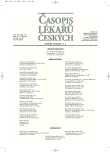Phytosterols as a Functional Food
Rostlinné steroly jako funkční potraviny
Návrat k dietě bohaté na složky rostlinného původu je zdrojem mnoha doporučení, která si kladou za cíl snížení hladin celkového (resp. LDL) cholesterolu. Rostliny syntetizují sloučeniny podobné cholesterolu, tzv. fytosteroly a fytostanoly, které jsou v západoevropské dietě přijímány v množství od 200 do 500 mg denně. Fytosteroly a fytostanoly sdílejí společné mechanizmy absorpce s cholesterolem a ovlivňují metabolizmus cholesterolu uvnitř enterocytu; oba typy fytoanalogů cholesterolu jsou účinné v redukci plazmatických hladin LDL-cholesterolu a jejich denní příjem v dávce 2 g/den sníží tuto hladinu o cca 15 %. Mechanizmus snižování hladin celkového i LDL cholesterolu tkví především v zamezení absorpce cholesterolu v lumen střeva, přičemž fytosteroly mohou zasahovat více do metabolizmu, protože na rozdíl od fytostanolů přecházejí do krevního oběhu a dosahují až 1 % z plazmatické koncentrace cholesterolu. Účinnost fytosterolů i fytostanolů lze ještě zvýšit jejich kombinací s dietními (n-3 vícenenasycené mastné kyseliny, vláknina) a farmakologickými (statiny) režimy. Rostlinné steroly a stanoly představují bezpečný dietní přístup ke snižování hladin cholesterolu při současném monitorování hladin karotenoidů.
Klíčová slova:
fytosteroly, fytostanoly, cholesterol, dieta.
Authors:
M. Vecka; A. Žák; E. Tvrzická
Authors‘ workplace:
IV. interní klinika 1. LF UK a VFN, Praha
Published in:
Čas. Lék. čes. 2007; 146: 337-342
Category:
Review Article
Overview
Many dietary recommendations which try to lower the concentration of total, respectively LDL cholesterol, force us to look back to vegetable-based diet. The plants synthesize many compounds similar to cholesterol, called phytosterols and phytostanols, and these sterols are consumed in average Western diet in amounts ranging from 200 to 500 mg/day. Phytosterols and phytostanols share the mechanisms of absorption with cholesterol molecule and influence the cholesterol metabolism inside the enterocytes. Both types of phytoanalogs of cholesterol were proven to be potent cholesterol-reducing agents; their daily intake about 2 g/day reduces the LDL-cholesterol by 15 %. The underlying mechanisms involve the prevention of cholesterol absorption from the gut lumen and slower esterification rate of phytosterols (phytostanols) inside the enterocytes. In contrary to phytostanols, phytosterols are absorbed with yet-to-be-considered efficiency, appearing in plasma with concentrations reaching as much as 1 % that of total cholesterol. The hypocholesterolemic effect of phytosterols (phytostanols) can be further supported with the combination of dietary (n-3 polyunsaturated fatty acids, fibre) regimen as well as pharmacological intervention (statins). To conclude, plant sterols represent safe dietary approach to lowering of plasma total cholesterol with the attention paid to the intake of lipid soluble vitamins.
Key words:
phytosterols, phytostanols, cholesterol, diet.
Labels
Addictology Allergology and clinical immunology Angiology Audiology Clinical biochemistry Dermatology & STDs Paediatric gastroenterology Paediatric surgery Paediatric cardiology Paediatric neurology Paediatric ENT Paediatric psychiatry Paediatric rheumatology Diabetology Pharmacy Vascular surgery Pain management Dental HygienistArticle was published in
Journal of Czech Physicians

- Metamizole at a Glance and in Practice – Effective Non-Opioid Analgesic for All Ages
- Metamizole vs. Tramadol in Postoperative Analgesia
- Obstacle Called Vasospasm: Which Solution Is Most Effective in Microsurgery and How to Pharmacologically Assist It?
- The Importance of Limosilactobacillus reuteri in Administration to Diabetics with Gingivitis
- The Importance of Hydration in Wound Healing
-
All articles in this issue
- Decompressive Craniectomy in the Treatment of Posttraumatic Edema and the Contribution of new Diagnostic Methods
- Milestones of Cardiovascular Pharmacotherapy: II. Digitalis
- Perioperative Betablockade
- Adjuvant Chemotherapy in the Treatment of Non-small Cell Lung Cancer
- Phytosterols as a Functional Food
- Genotype – Disease Association and Possibility to Reveal Environmentally Modifiable Disease Causes: The Use of Mendelian Randomization Principle
- How to Continue in the Treatment of Tuberculosis in the Czech Republic?
- Factors Modulating Parameters of Cholesterol Homeostasis in the Metabolic Syndrome
- Relation Between Alcohol Intake and Some Metabolic and Cardiovascular Risk Factors in the Healthy Men
- Practical Aspects and Clinical Value of t(14;18) Monitoring in Peripheral Blood of the Follicular Lymphoma Patients
- Effect of Surgical Treatment of Atrial Fibrillation on the Attainment and Maintenance of Sinus Rhythm in Patients Undergoing Concomitant Cardiac Surgery – Short-term Results
- The Use of Thrombelastography in Evaluation of Coagulation in Females with Physiological or Pathological Gravidity
- The Use of Paracetamol in Children –Benefits and Risks
- Indication to Occlusion of Patent Foramen Ovale in Patient with Pulmonary Hypertension after a Cardioembolic Stroke
- Journal of Czech Physicians
- Journal archive
- Current issue
- About the journal
Most read in this issue
- Adjuvant Chemotherapy in the Treatment of Non-small Cell Lung Cancer
- Indication to Occlusion of Patent Foramen Ovale in Patient with Pulmonary Hypertension after a Cardioembolic Stroke
- Phytosterols as a Functional Food
- The Use of Paracetamol in Children –Benefits and Risks
